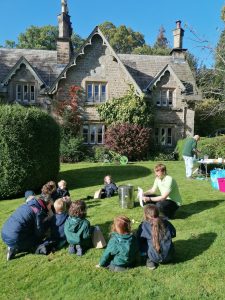Transformations
Montessori education has long been celebrated for its innovative approach to learning, one that not only focuses on the academic, but predicates that potential on the nurturing of personal growth and self-discovery. Children are learners, what the Montessori approach offers is the opportunity for a child to see themselves as capable of learning, to have the skills to learn, and the environment in which to do so. The emphasis is not on children being taught, or even learning happening with a child. We look to transform the child from an almost passive receiver of information into an empowered discoverer, researcher and synthesiser. This transformation is not limited to the pupil alone; teachers, too, find themselves profoundly changed by the Montessori method. Through the patient guidance of the teacher and the gradual unfolding of the learner’s potential, Montessori education reshapes the dynamics of teaching and learning in ways that leave both enriched and empowered.
One of the cornerstones of Montessori education is the cultivation of patience. For teachers, the journey begins with setting aside the traditional urge to “fix” or control every aspect of the classroom. Instead, they learn to observe, trust the process, and allow students to progress at their own pace. At Wharfedale we aim to cultivate an atmosphere that supports children in solving and resolving issues themselves. Whilst this requires patience from the adults, the long-term benefits for the children are great.
This patience extends beyond the classroom, influencing how teachers approach challenges in life. Montessori educators often speak of the profound inner shift they experience—how slowing down and focusing on the process over the outcome fosters a more empathetic, reflective mindset.
For pupils, this patience manifests as freedom. In a Montessori environment, they are encouraged to explore, make mistakes, and try again without fear of judgment or time pressure. This nurturing atmosphere allows them to see themselves as learners – not of facts or information (although they do learn these!) but of the ‘how’ to learn, and perhaps crucially, the ‘why’.
Montessori education thrives on the understanding that learning is a long-term journey rather than a race to achieve immediate results. The curriculum is designed to allow pupils to revisit concepts repeatedly, deepening their understanding over time. This approach transforms how both teachers and pupils view progress. Teachers develop a profound appreciation for each small step in the learning process, celebrating milestones that might otherwise go unnoticed in a more traditional setting. This mindset shift fosters a classroom culture of encouragement and curiosity rather than one driven by comparison or competition.
For students, this emphasis on the long-term process helps them develop intrinsic motivation. They learn not for the sake of grades or external validation, but because the joy of discovery and mastery is its own reward. Over time, they develop a love of learning that extends far beyond the classroom.
This transformation isn’t just academic—it’s deeply personal. Montessori students become confident, self-aware individuals with a keen ability to collaborate, communicate, and solve problems. They learn to take ownership of their choices and to see themselves as capable of influencing the world around them.
Teachers, in turn, witness this transformation as a profound privilege. To guide a child from curiosity to competence, from self-doubt to self-assurance, is an experience that redefines the purpose of teaching. Teachers often find themselves inspired by their students, learning as much from them as they teach.
Montessori education reshapes the roles of both teacher and pupil, creating a partnership in learning. Teachers evolve into facilitators and mentors, while students emerge as independent thinkers and confident individuals.
This shared transformation speaks to the heart of Montessori’s philosophy: education is not about filling minds with knowledge, but about nurturing the whole person. As teachers become more patient and reflective, and as pupils grow into their fullest potential, both embark on a lifelong journey of growth, discovery, and mutual inspiration.
Montessori education is more than a method; it’s a philosophy that reimagines what it means to learn—and to teach. For those who embark on this path, the transformation is profound, lasting, and deeply rewarding.


